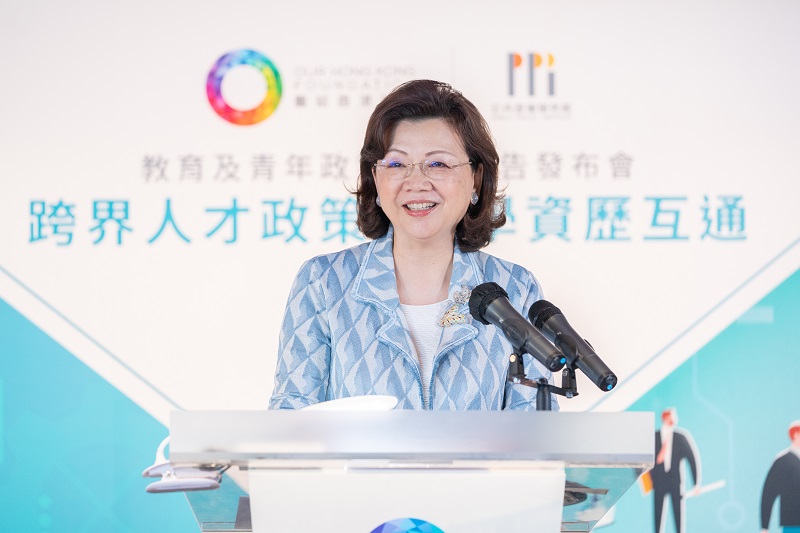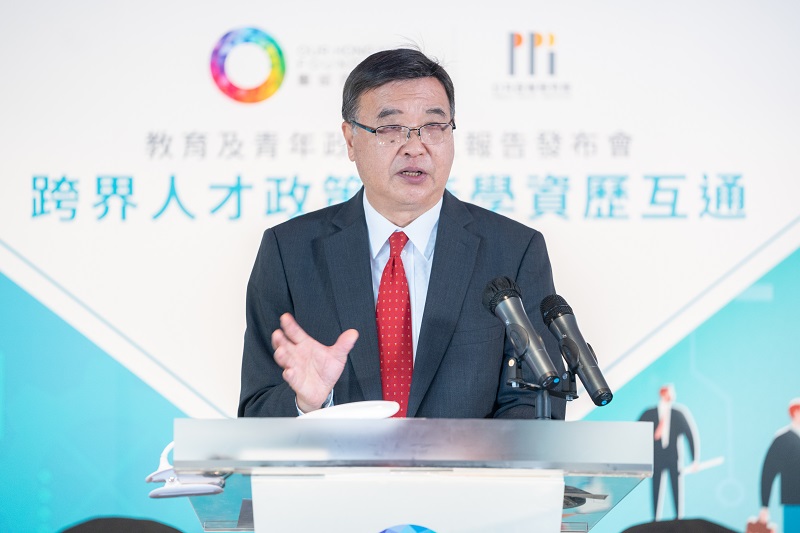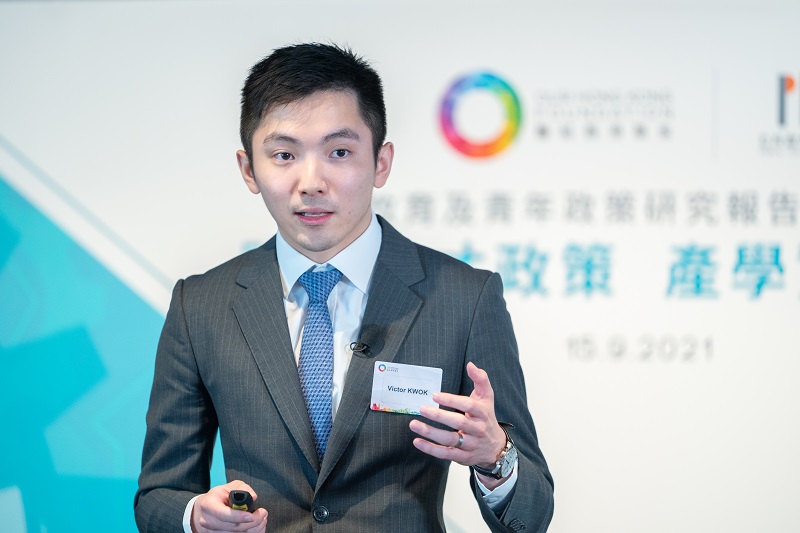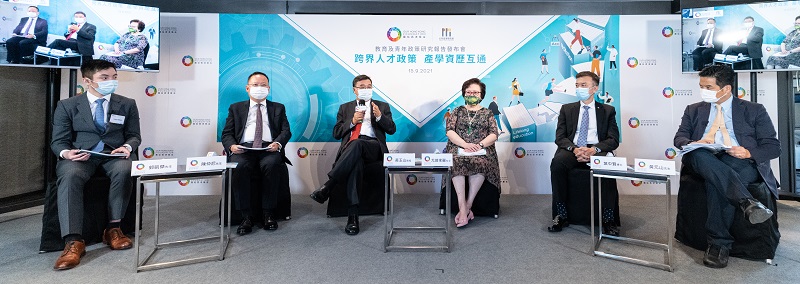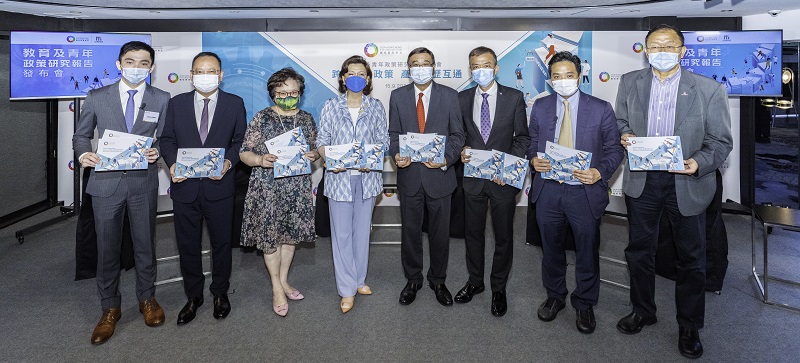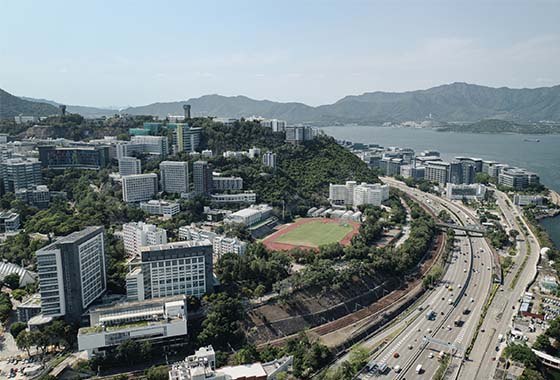Our Hong Kong Foundation releases its latest education research report
OHKF Releases Policy Research Report to Boost Talent Competitiveness
(15 September 2021, Hong Kong) Our Hong Kong Foundation (OHKF) releases its latest education research report that urges the Government to strengthen school-industry collaboration, to build flexible progression pathways for the accreditation of qualifications, and to support diverse talent development to raise Hong Kong’s talent competitiveness on the global stage.
Reindustrialisation and digitalisation have exacerbated the global competition for talents. Society must rethink the role and direction of education so that workers of all ages can capitalise on the opportunities brought about by technological advances. Hong Kong needs to pivot away from the traditional focus on pre-employment education and promote lifelong learning as a means for learners to acquire in-demand skills that meet industry needs and individual personal growth aspirations.
Entitled Preparing for the 21st Century Globally Competitive Workforce—Industry-led Standards of Applied Education and Lifelong Learning, the Report recommends that the HKSAR Government raise the overall competitiveness of Hong Kong’s human capital through three interlinked approaches: establishing manpower policies, revamping the accreditation system, and enhancing funding mechanisms.
School-Industry Skills Mismatch and a Weak Lifelong Learning Culture Are Denting Hong Kong’s Talent Competitiveness
The 2020 IMD World Talent Rankings show that Hong Kong dropped from 10th in 2016 to 14th out of 63 countries and regions; while Singapore climbed from 15th to 9th. A factor contributing to the slip in talent competitiveness is the mismatch between talent output and the employer demand. A survey by the Federation of Hong Kong Industries shows that 58% of Hong Kong enterprises currently upgrading and restructuring their operations regard the lack of suitable local talents as their biggest obstacle, while another study shows that 75% of employers in Hong Kong experienced difficulties in finding staff with the right skills.
The Report points out that Hong Kong’s education system is unable to provide flexible and inclusive continuing education pathways. The city’s participation rate in continuing education has stalled at 20%, which pales in comparison with Singapore’s 49%. The Government spends only 0.5% of its total education expenditure on continuing education, which is only one-tenth of the average of the United Kingdom, Germany, and Singapore. While countries around the world are expending ever greater efforts in upskilling and reskilling their workforces, Hong Kong has been unable to change public perception of continuing education as a mere recreational activity. This is exacerbated by the misalignment between academic, applied, and industry qualifications; the absence of an “overpass” between industry qualifications and academic qualifications blocks off the possibility of building progression pathways between all three qualifications.
This Report puts forward 14 policy recommendations under three main areas—Governance, Accreditation, and Funding—to create a versatile and flexible talent ecosystem that will cater to the demands of society in future.
Recommendation 1. Optimising the Governance Framework and Formulating Talent Policies for Upskilling and Reskilling
The lack of a comprehensive human resources strategy for Hong Kong not only fails to support the upgrading and transformation of various industries, but also severely hinders sustainable economic development. To maintain Hong Kong’s economic and talent competitiveness, the OHKF recommends that the Government link up bureaux, businesses, and academics to map out policy blueprints for industry development and talent needs. The Human Resources Planning Commission, chaired by the Chief Secretary for Administration, should plan for industry-specific skill requirements by coordinating with Government departments based on relevant blueprints, thereby translating economic planning into educational and manpower policies.
The entire process should incentivise industry participation, while taking regional economic development—especially that of the Greater Bay Area—into consideration, so as to open up opportunities for local talents. The Report further calls for a designated government department to support industry transformation, which will foster closer school-industry partnerships that guide education development.
The OHKF believes that manpower policies can set clear goals for lifelong learning to enable universal upskilling and reskilling. The lack of lifelong learning culture in Hong Kong means that publicly-funded organisations, such as the Employees Retraining Board and the Vocational Training Council, lack the resources or official capacity to provide subsidised and accredited courses for all working individuals. We recommend that the Government assess the designation of relevant bodies or projects, consolidate programme curricula and funds, and enhance the authority and functions of said bodies, in an effort to boost lifelong learning and build a competitive workforce.
Recommendation 2. Reforming the Accreditation System to Offer Diverse Progression Pathways
A flexible accreditation system is crucial to talent development. Each industry needs to align academic and applied qualifications with industry certifications, in order to offer study and career progression pathways. The Report considers that programmes’ quality assurance and funding priorities should focus on graduates’ learning outcomes rather than applicants’ exam results. We advocate increasing the aptitude‑based admission quota for sub‑degrees from 5% to 30%, while setting the quota for the Applied Degrees pilot scheme at 50%.
The Report urges closer school-industry collaboration on the curriculum design, assessment, and delivery of applied programmes, so that academic qualifications and industry standards can be fully integrated under the Qualifications Framework (QF). Close cooperation is needed between business chambers, schools, and the Hong Kong Council for Accreditation of Academic and Vocational Qualifications (HKCAAVQ); employers and chambers should identify key skills in their respective industries for schools to incorporate into programmes and workplace learning experiences, which are crucial to students’ later career development. The Government should lead by example in integrating QF qualifications in its hiring, promotion, procurement, and licensing practices, so that industries will follow suit and ensure that these learning outcomes are recognised by local and regional employers.
At the same time, bite-sized learning has become indispensable to continuing education as education technology advances rapidly. Micro‑credentials and corporate in‑house training could be validated as academic credit requirements or accredited as Micro-Bachelors and Micro-Masters programmes, a move that could help dovetail industry certifications with academic qualifications, and employability.
Cross-border accreditation and school-industry collaboration can not only support youth talent development, but also respond to national plans on education development. HKCAAVQ should coordinate with mainland accreditation authorities and local employers with mainland presence to develop regional cross accreditation, building a GBA mutual recognition mechanism to broaden talent development pathways.
Recommendation 3. Building a Future‑Oriented Funding Mechanism to Support Upskilling and Reskilling for All
Hong Kong’s public education expenditure is primarily spent on formal and academic education. However, in today’s knowledge-based economy, maintaining talent competitiveness is dependent on constantly updating one’s skillset. Therefore, the Report calls for a lifelong skills development grant that offers HKD100,000 to all those in the 18 - 65 age bracket for taking courses relevant to their professional development. The Government should also revamp the Continuing Education Fund to target its funding based on industry-specific needs, broaden its course selection, and relax eligibility to promote wider usage.
In addition, there should be a rigorous review process to ensure courses covered by the Study Subsidy Scheme for Designated Professions/Sectors are aligned with future competencies. Subsidies should be increased according to costs incurred by self financing institutions, in order to support programmes that meet the talent needs of emerging industries, as well as including part-time courses.
To incentivise industry participation in upskilling the population, the OHKF advocates the Government to provide financial incentives such as grant funds, tax deductibles, and absentee payroll subsidies to encourage businesses to participate in the design, provision, evaluation, and implementation of programmes. Small and medium enterprises should be encouraged to adopt industry skills frameworks and offer more continuing professional development.
Rethinking the Purpose of Education to Support Sustainable Social Development
The Report underscores that Hong Kong is at a crossroads of industry upgrade and talent development. To support Hong Kong’s sustainable development as a knowledge-based economy, an education reform is needed to allow every individual to stay competitive throughout different stages of their lives, resulting in a learning society. The OHKF puts forward various recommendations to establish flexible work and study progression pathways to enhance Hong Kong talents’ competitiveness.
Chairman of the Research Grants Council of Hong Kong Professor Wong Yuk-shan underlined: “In the traditional learning structure, academic and vocational education co-exist as two parallel systems that do not intersect. An ‘overpass’ needs to be built between the two for learners to flexibly enter or exit study in preparation for future challenges.”
OHKF President Mrs Eva Cheng remarked: “Amidst global industrial transformation, countries around the world are investing more in training human capital. In contrast, Hong Kong’s decline in global talent competitiveness ranking comes as a warning that society must rethink the role of education. We need to offer resources and opportunities for lifelong education for every individual, to maintain Hong Kong’s competitive edge in the new industrial revolution.”
OHKF Senior Vice President and Executive Director of Public Policy Institute Mr Stephen Wong stated: “Education is closely linked to human capital. The Government's education planning needs a comprehensive industry and manpower development blueprint beyond high-level committee decisions. This can in turn promote sustainable socioeconomic development and create development opportunities for all.”
OHKF Head of Education & Youth Research of Public Policy Institute Mr Victor Kwok pointed out: “Currently, Hong Kong only earmarks 0.5% of total education public expenditure for continuing education, which is significantly lower than other advanced economies. We recommend that the Government offer a HKD 100,000 lifelong skills development grant to every individual for upskilling and reskilling to
support economic transformation.”
Full Report of Preparing for the 21st Century Globally Competitive Workforce—Industry-led Standards of Applied Education and Lifelong Learning:
Chinese version:https://bit.ly/3BXMCD0
English version:https://bit.ly/3lmfYnR
Full live press conference: https://youtu.be/kYSN0ZEuBHs?t=248
